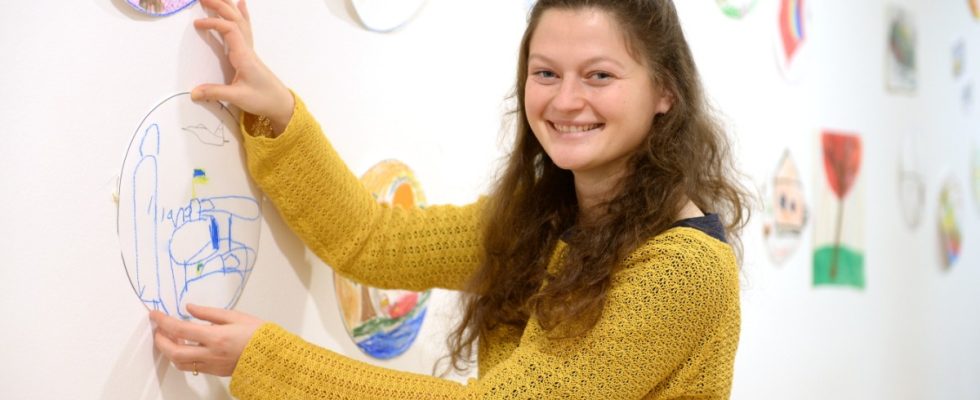There is a house made of white cardboard, waist high. On a wall is written in small Cyrillic letters: “Please knock three times.” Yevgenija Korman is a psychotherapist in training and works with refugee children from Ukraine. “With the houses they have designed a place according to their own rules.” An experience for which there is otherwise little room: deciding for yourself what happens and who is allowed to come in.
Refugio Munich’s Mental Health Center Ukraine (MHCU) offers psychosocial first aid for people who have fled because of the war. The focus is on short-term interventions. In up to five individual or up to eight group appointments, acute issues are addressed and strategies are taught on how to deal with them. “We often talk about how we deal with news. Some have activated push notifications and alarms on their cell phones to warn their families in Ukraine if bombs are falling again. You have to ask yourself the question: what is a good measure for that? I don’t get sick myself?” Dealing with common triggers such as the sound of airplanes is also part of this, as is education about mental illnesses.
Where there are no words for feelings, paint and paper help. The walls in the rooms at Franziskanerstrasse 14 are decorated with the works of art by children and young people. One of the pictures shows a house with a dog that had to be left behind. Over time, the children become more open, laugh more, and maintain eye contact for longer. “Some people ask: ‘Can we come back tomorrow?’, even though the group doesn’t take place again for another week,” says Yevgenia Korman.
A unique project in Germany: Each case is supervised by a social worker as well as therapeutically. The questions often overlap – especially when it comes to children and young people. “Communication with all departments is important: with the school, the youth welfare office, with legal carers. This is the only way we can offer the best support for the child.”
What has also proven useful: While the children are in a group, the parents can exchange ideas in the next room. It is also important for the children to have this space. “A child once told me: ‘Here I can just speak or express my opinion without burdening anyone,'” says Yevgeniya Korman. The topic of loss plays a particularly important role. “For example, if a parent died at the front.”
Many of them are also connected to their school at home via online lessons. This means that contact with classmates is maintained. But it also means more pressure – from German and Ukrainian teachers as well as parents – to do well in both systems. “This pressure from all sides makes integration more difficult and leads to illnesses more quickly. We help you find a good middle ground.”
Living with uncertainty is a recurring theme. “Every day that the war continues is one too many.” There are big questions about the future, especially for teenagers. Many planned to study in Ukraine. And now? “As a therapist, I can’t give an answer or tell someone what someone should do,” emphasizes Yevgenia Korman. “But we can think about it and take a closer look at the options. How about doing one or the other? How does that feel? What kind of images emerge?”
The ten-person team, led by educator Andrea Gebhardt and doctor Camilla Ulivi, consists of psychologists, a social worker, a psychiatrist and peer counselors. The MHCU is characterized by collaboration from different disciplines.
Yevgenija Korman is also supporting the project scientifically. “Among other things, we collect data on satisfaction and how performance changes.” This shows that the concept works.
Both Ukrainian and Russian employees and cultural mediators help to offer the program in the clients’ native language. They appreciate this because a lack of knowledge of German is often a barrier to benefiting from psychosocial support. In some cases, the people cannot yet express themselves well enough in German and can usually only speak in their native language with people who are also stressed.
Research results also show that psychotherapeutic treatment in the mother tongue works better, even if you have a good knowledge of the second language. Cultural mediators who not only know the translation but also the subtext also play a major role here. For example, in German “Yes” and “No” are colloquial, in other languages and cultures it is sometimes hidden behind other formulations. But this help doesn’t come cheap. There is a lack of money to hire cultural mediators to ensure that all projects can be offered in the native language. The art therapy group’s offerings can also be further financed through donations, for example for materials such as cardboard. So that the children can build houses again.
From May 2022 to September 2023, over 420 people have already been cared for. “The fact that we were able to take action so quickly after the start of the war was due to many donations,” says Korman. “We were lucky that there was a lot of solidarity.”
However, the requests exceed the capacities. “We planned to offer everyone a place after one or two weeks.” There is now a waiting period of at least four weeks before someone can take advantage of the offers. The need is increasing, especially among children and young people. Yevgenija Korman and the Mental Heath Center Ukraine team would be happy to accommodate this. “But we are happy if we can continue to do justice to the current registrations for next year.”
In the hallway, the pictures show what’s going on in the children’s heads, their hopes and fears. One picture shows the cosmos and many stars, another shows a colorful house with gray airplanes in the sky.
Here’s how you can donate: “Advent calendar for good works from the Süddeutsche Zeitung eV” Stadtsparkasse München IBAN: DE86 7015 0000 0000 6007 00 BIC: SSKMDEMMXXX

